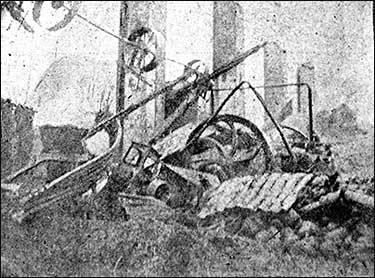The Argus, 15th December 1916, transcribed by Kay Collins
|
|
Fire at Mr. J. Clark's
|
|
Disastrous Farm Fire
Horses and Calves Burnt at Rushden
|
A disastrous fire, involving damage amounting to thousands of pounds, occurred in the early hours of Sunday morning last at Rushden.
The buildings involved were the stables and farm building just between the railway line and the Wellingborough-road, Rushden, at the bottom of the first hill leaving Rushden, and they belonged to Mr. John Clark, whose residence is near by. An alarm was sent to the fire station at 12.30a.m., and very shortly the brigade made a smart turnout with the steamer under Second Officer G. R. Turner. But when they arrived at the outbreak they found the stables and buildings hopelessly involved, and very soon after the brigade got to work upon the flaming woodwork the whole structures collapsed like a pack of cards, sending up a great display of leaping flames, sparks, and smoke.
 |
|
After the Fire
|
The tragedy of the whole affair was the fact that three valuable horses, besides five claves, were in the burning buildings, and these poor creatures were burned to death.
The brigade were successful in saving several stacks which were quite close to the buildings destroyed, but one stack of pedigree barley was destroyed. The building contained a gas engine and dynamo.
We understand that Mr. J. Clark was absent from home during the fire, but that the damage is covered by insurance. Mr. Clark had the misfortune to lose two ricks by fire last year, and it was believed that they were fired by a spark from a passing engine. The fire raged all through the night, and was still burning on Sunday morning, but the brigade had localised the fire and had it well under control. The firemen present were Engineer Claude Green, and Firemen J. Sparrow, J. Whiting, L. Britchford, H. Paynes, C. Timson, J. Wooding, and A. Jaques.
The greatest praise is due to Second Officer Turner, who worked all through the night and then returned home for a meal, turning out with the Volunteers for a route march on Sunday morning. This from a man well over 65 years of age shows stamina, and a keen sense of public duty. Before the brigade arrived excellent work was done by persons attracted to the neighbourhood by the fire. These persons succeeded in saving a number of beast from a horrid death.
It is reported that Mr. W. G. Wilmott, contractor, Rushden, who lives near the scene of the outbreak, was returning home by the 11.45p.m. train on Saturday and saw, as the train passed, that the buildings were apparently all right then. Soon after he reached home, Mr. King, of Tichmarsh, who was staying with Mr. Wilmott, noticed the fire, and they went to the spot. Mr. Sparrow, a Special Constable and fireman, also saw the fire as he was going off duty, and he gave the alarm to the police and Fire Brigade. Inspector Osborn, Sergt. Brunmby, and P.C. Sharman were soon on the spot, and a number of beast were released from the fire-attacked buildings.
Owing to the fact that Captain Fred Knight had been indoors with influenza for the past few days, the brigade was commanded by Second Officer Turner.
Great assistance was rendered by the police in salving property. P.C. Sharman, assisted by Mr. W. G. Wilmott and Mr. King, were first on the scene, and they were instrumental in releasing several beasts and pigs. They also succeeded in entering the burning cart-shed, over which is a chaff-lift, and removing three burning carts. Then Sergt. Brumby, who arrived on a commandeered bicycle, assisted, and the remaining six trolleys and farm carts were removed, very little burned.
It was thought that the whole of the live stock had been saved until the agonised cries of the burning horses told the sad tale that some poor creatures were suffering a terrible death. The state of the frozen roads considerably delayed the arrival of the Fire Brigade, but meanwhile excellent work was being done by Inspector Osborn, the two policemen, Mr. C. Clark, and other helpers who got to work on the ricks with buckets of water. There is no doubt that had it not been for the activities of the police and their assistants the whole buildings and the other ricks and farm stock would have been destroyed.
An incident which had its tragic, as well as amusing, features occurred during the fire. It was noticed the watchdog, a new one, was fixed to its burning kennel. The dog’s struggles were fierce, and eventually it broke away and bolted.